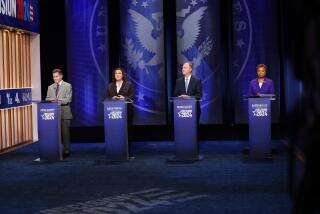Politics Fouls War Debate
- Share via
Democrats and Republicans are accusing each other of playing politics over going to war in Iraq. Both are right. Which is why the nasty dispute between Senate Majority Leader Tom Daschle (D-S.D.) and President Bush about who’s really interested in America’s national security epitomizes where the Iraq debate should not be headed.
Instead of engaging in name-calling and political advantage-seeking, the White House needs to make as persuasive a case as it can for war--and Congress needs to scrutinize it on its merits. Young Americans will be sent off to fight Iraq, if it comes to that. They and their families deserve to know exactly what is intended and how it will get done.
With November elections looming and the economy looking sicker, the temptation for Republicans to focus on war is natural.
But in casually accusing the Senate on Monday night at a New Jersey fund-raiser of being uninterested in national security, President Bush crossed a line. Bush appears to have realized this, declaring in the Rose Garden on Thursday that the debate “will be conducted with all civility” and signaling compromise on a proposed United Nations resolution.
Civility, however, is not the real issue. A good debate is impassioned and vigorous, even angry. The fact is that for all his pique about Bush’s comments, Daschle has failed to lead his party. Democrats’ silence in response to the administration’s full-court press for war has only made the splits among the party’s potential presidential contenders starker. Sens. Joseph I. Lieberman (D-Conn.) and John Edwards (D-N.C.) stake out hawkish positions, while former Vice President Al Gore is all tough-dove.
Daschle’s tactical responses to the administration have been inept: Initially, he favored prolonged debate about the war, but now he is pushing for a resolution in two weeks because Democrats are desperate to get back to discussing sinking 401(k) plans. In his rush, Daschle isn’t asking the substantive questions that need to be asked.
They include: How convincing are the administration’s justifications for war? Suddenly, the White House is back to claiming specific links between Al Qaeda and Iraq. National Security Advisor Condoleezza Rice says that Saddam Hussein has sheltered Al Qaeda terrorists and trained them in chemical weapons. She should show Americans the evidence.
President Bush says that Al Qaeda could become “an extension of Saddam’s madness.” What, exactly, does that mean, considering that most of the 9/11 attackers were Saudi and none was Iraqi? How would the war on terrorism be disrupted or helped by an invasion of Baghdad? Is the administration willing to work with the U.N. on getting weapons inspectors into Iraq if a satisfactory Security Council resolution is passed? What plans does the administration have for a postwar Iraq?
The country deserves substance on this momentous issue, not the spin control it’s been getting too much of.
More to Read
Get the L.A. Times Politics newsletter
Deeply reported insights into legislation, politics and policy from Sacramento, Washington and beyond. In your inbox twice per week.
You may occasionally receive promotional content from the Los Angeles Times.










